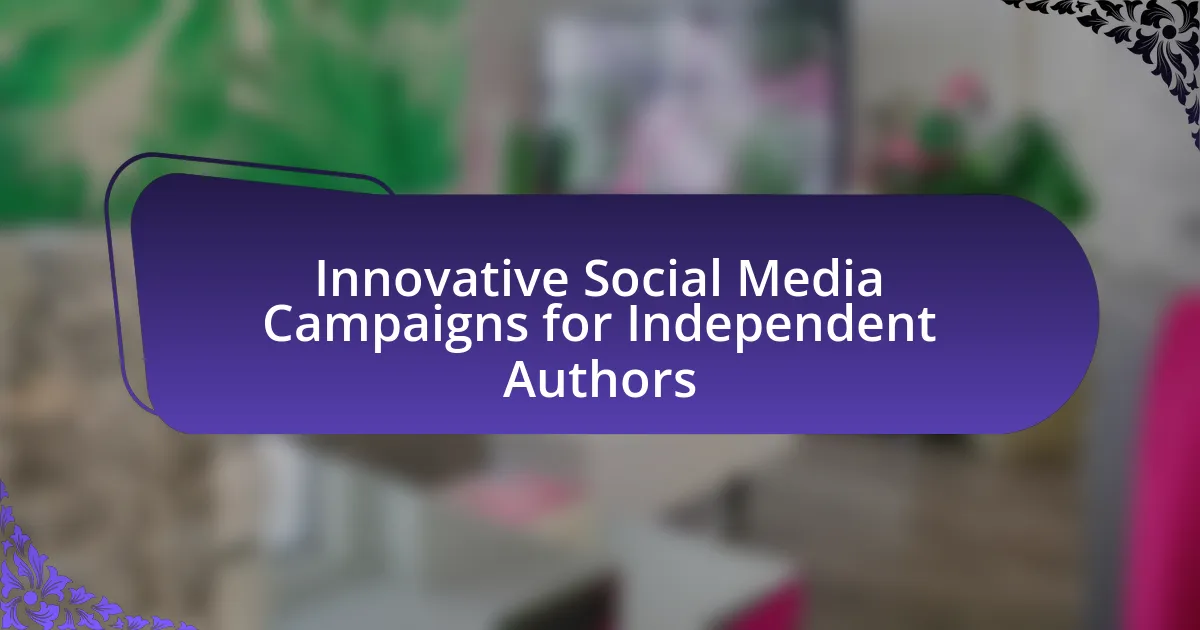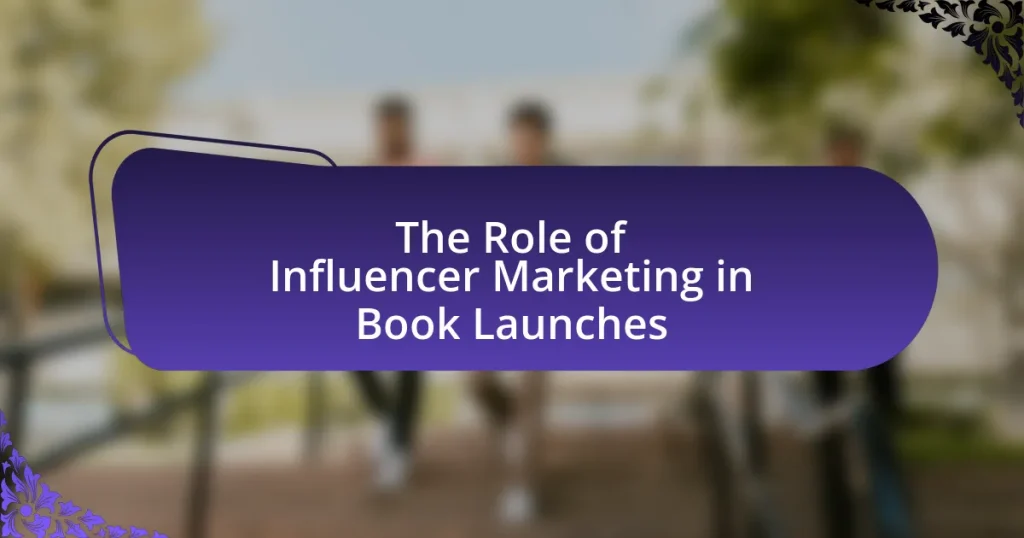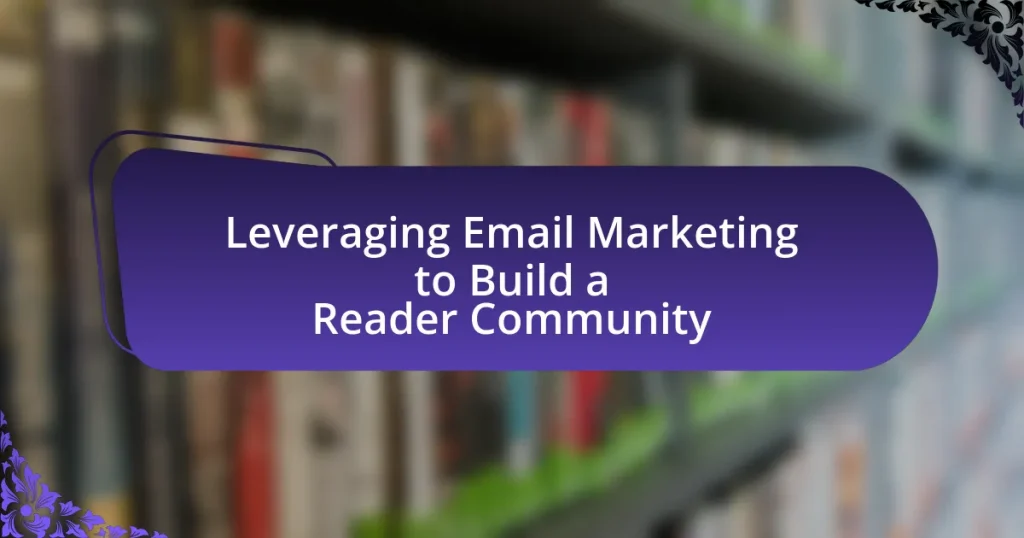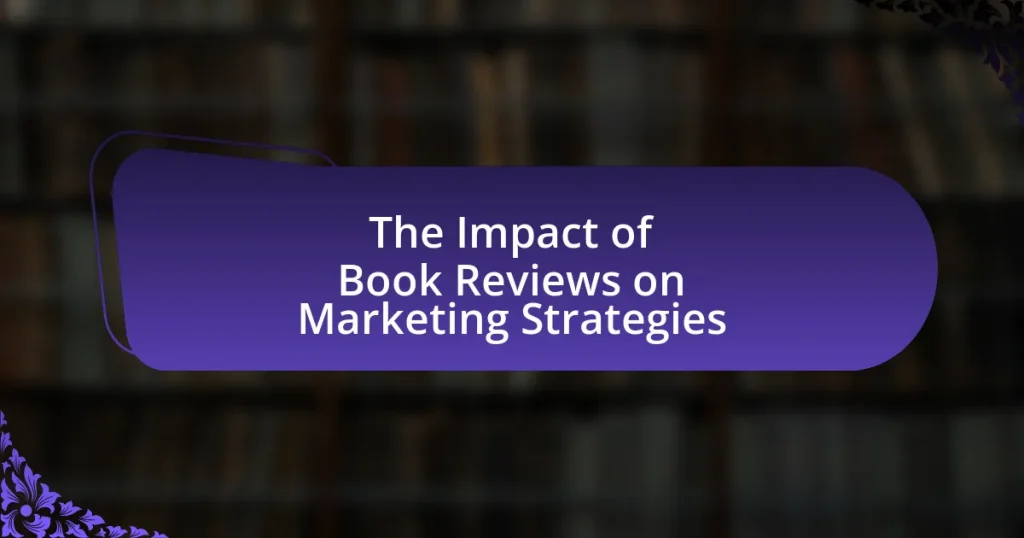Innovative social media campaigns for independent authors focus on strategies such as interactive storytelling, virtual book tours, and user-generated content to enhance reader engagement and expand visibility. These campaigns differ from traditional marketing by fostering two-way communication and community building, which are essential for independent authors facing unique challenges like limited resources and competition. Key components of successful campaigns include clear objectives, targeted audience engagement, and compelling content, while emerging technologies and collaborations can further amplify reach. The article outlines practical tips for authors to effectively manage their social media presence and measure campaign success, emphasizing the importance of authenticity and consistent branding in building a loyal reader base.
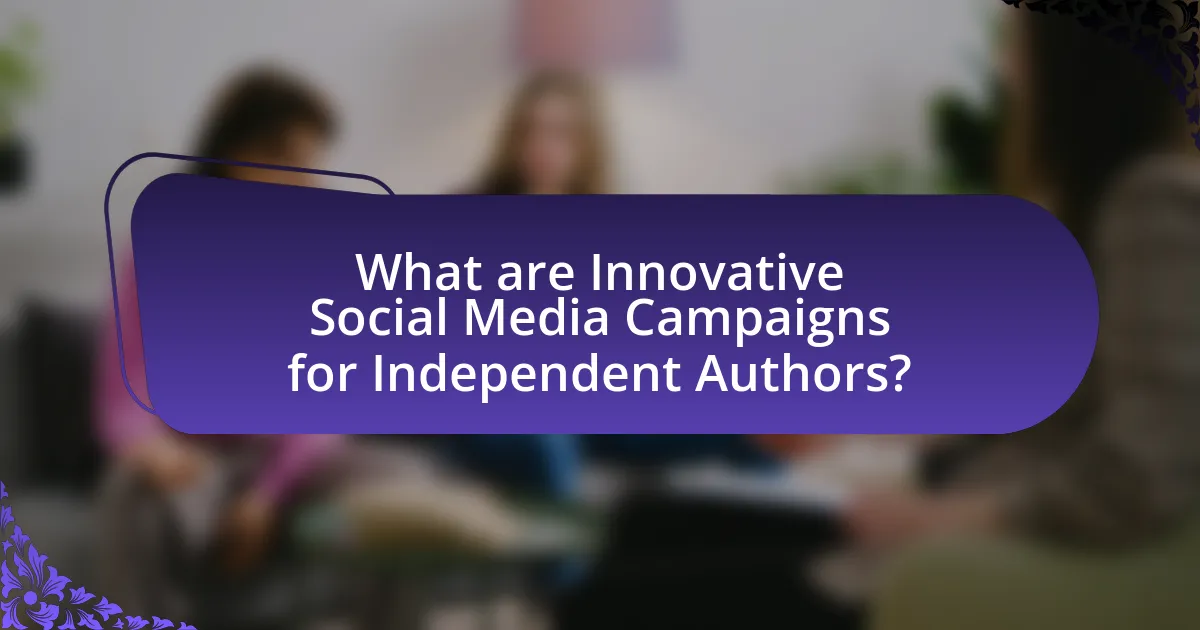
What are Innovative Social Media Campaigns for Independent Authors?
Innovative social media campaigns for independent authors include interactive storytelling, virtual book tours, and user-generated content initiatives. Interactive storytelling engages readers by allowing them to influence the narrative through polls or comments, fostering a sense of community and investment in the story. Virtual book tours leverage platforms like Instagram Live or Facebook Live to reach audiences directly, providing real-time interaction and discussion about the book. User-generated content initiatives encourage readers to share their interpretations or experiences related to the book, often using specific hashtags, which can significantly increase visibility and engagement. These strategies have been shown to enhance reader connection and expand an author’s reach in a competitive market.
How do these campaigns differ from traditional marketing strategies?
Innovative social media campaigns for independent authors differ from traditional marketing strategies primarily in their focus on direct engagement and community building. Unlike traditional marketing, which often relies on one-way communication through advertisements, social media campaigns encourage two-way interactions, allowing authors to connect personally with their audience. This approach fosters a sense of community and loyalty, as authors can respond to feedback, share behind-the-scenes content, and create a more relatable brand image. Additionally, social media campaigns leverage data analytics to target specific demographics more effectively, enabling authors to tailor their messaging and reach potential readers in a more personalized manner. This contrasts with traditional marketing’s broader, less targeted outreach methods, which may not resonate as deeply with individual consumers.
What unique challenges do independent authors face in social media marketing?
Independent authors face several unique challenges in social media marketing, primarily due to limited resources and visibility. Unlike traditional publishers, independent authors often lack marketing budgets, which restricts their ability to run paid advertising campaigns that can enhance reach and engagement. Additionally, they must compete with established authors and brands that have larger followings and more significant marketing support, making it difficult to gain traction in crowded social media spaces.
Moreover, independent authors frequently struggle with content creation and consistency, as they juggle writing with marketing efforts. This can lead to irregular posting schedules, which negatively impacts audience engagement. According to a survey by the Alliance of Independent Authors, 70% of independent authors report that marketing their books is one of their biggest challenges, highlighting the need for effective strategies tailored to their specific circumstances.
How can innovative campaigns address these challenges?
Innovative campaigns can address challenges faced by independent authors by leveraging unique storytelling techniques and interactive content to engage audiences. These campaigns utilize platforms like Instagram and TikTok to create visually appealing and shareable content that resonates with target demographics. For instance, a campaign that incorporates user-generated content can foster community involvement, enhancing visibility and reach. According to a study by HubSpot, campaigns that encourage audience participation can increase engagement rates by up to 28%. By focusing on authenticity and relatability, innovative campaigns can effectively break through the noise in a crowded market, ultimately driving book sales and building a loyal reader base.
Why are social media campaigns essential for independent authors?
Social media campaigns are essential for independent authors because they provide a cost-effective platform for reaching a wide audience and building a personal brand. Independent authors often lack the marketing budgets of traditional publishers, making social media an invaluable tool for promoting their work and engaging with readers directly. According to a survey by the Author Earnings Report, over 50% of independent authors attribute their book sales to social media marketing efforts, highlighting its effectiveness in driving visibility and sales. Additionally, social media allows authors to create communities around their work, fostering reader loyalty and encouraging word-of-mouth promotion, which is crucial for success in a competitive market.
What role does social media play in an author’s visibility?
Social media significantly enhances an author’s visibility by providing a platform for direct engagement with readers and the broader literary community. Authors can share their work, interact with fans, and participate in discussions, which increases their reach and recognition. According to a 2021 survey by the Author’s Guild, 70% of authors reported that social media was a key factor in building their audience. This demonstrates that effective use of social media can lead to greater book sales and a stronger personal brand for authors.
How can social media enhance reader engagement for independent authors?
Social media can enhance reader engagement for independent authors by providing direct communication channels and interactive platforms. These platforms allow authors to share updates, solicit feedback, and create discussions around their work, fostering a sense of community. For instance, a study by the Pew Research Center found that 69% of adults in the U.S. use social media, indicating a vast audience for authors to connect with. Additionally, authors can utilize features like live Q&A sessions, polls, and storytelling through posts to engage readers actively, which can lead to increased loyalty and interest in their books.
What are the key components of successful social media campaigns?
The key components of successful social media campaigns include clear objectives, targeted audience engagement, compelling content, consistent branding, and performance analytics. Clear objectives guide the campaign’s direction, ensuring that efforts align with specific goals such as increasing brand awareness or driving sales. Targeted audience engagement focuses on understanding and reaching the right demographic, which enhances the effectiveness of the campaign. Compelling content, including visuals and storytelling, captures attention and encourages sharing, while consistent branding maintains a unified message across platforms. Performance analytics provide insights into what works and what doesn’t, allowing for data-driven adjustments to optimize future campaigns. These components collectively contribute to the success of social media initiatives, as evidenced by studies showing that campaigns with defined goals and audience targeting achieve higher engagement rates.
What types of content resonate most with readers on social media?
Visual content, particularly images and videos, resonates most with readers on social media. Research indicates that posts with visuals receive 94% more views than those without, highlighting the effectiveness of engaging imagery. Additionally, storytelling content, such as personal anecdotes or narratives, fosters emotional connections and encourages sharing, making it highly effective in capturing audience interest. According to a study by BuzzSumo, articles that include storytelling elements are shared 22 times more than those that do not. Furthermore, interactive content, such as polls and quizzes, significantly boosts engagement rates, as users are more likely to participate and share their opinions.
How can independent authors leverage user-generated content?
Independent authors can leverage user-generated content by encouraging readers to share their experiences and interpretations of their work on social media platforms. This strategy not only enhances engagement but also builds a community around the author’s brand. For instance, authors can create specific hashtags for readers to use when posting reviews, fan art, or discussions about the book, which can increase visibility and attract new readers. According to a study by the Content Marketing Institute, 79% of people say user-generated content highly impacts their purchasing decisions, demonstrating the effectiveness of this approach in driving sales and fostering loyalty among readers.
How can independent authors measure the success of their campaigns?
Independent authors can measure the success of their campaigns by analyzing key performance indicators (KPIs) such as sales figures, engagement rates, and audience growth. Sales figures provide a direct measure of financial success, while engagement rates, including likes, shares, and comments on social media, indicate how well the content resonates with the audience. Additionally, tracking audience growth across platforms can reveal the effectiveness of outreach efforts. According to a study by the Book Industry Study Group, 70% of independent authors reported that social media engagement directly influenced their book sales, underscoring the importance of these metrics in evaluating campaign success.
What metrics should authors track to evaluate campaign effectiveness?
Authors should track engagement metrics, conversion rates, and reach to evaluate campaign effectiveness. Engagement metrics include likes, shares, comments, and overall interaction with content, which indicate audience interest and involvement. Conversion rates measure the percentage of users who take a desired action, such as signing up for a newsletter or purchasing a book, reflecting the campaign’s ability to drive sales. Reach quantifies the total number of unique users who see the campaign, providing insight into its visibility and potential audience size. Tracking these metrics allows authors to assess the impact of their social media campaigns and make data-driven adjustments for improvement.
How can authors adjust their strategies based on performance data?
Authors can adjust their strategies based on performance data by analyzing metrics such as engagement rates, click-through rates, and conversion rates from their social media campaigns. By identifying which content resonates most with their audience, authors can refine their messaging, optimize posting times, and select the most effective platforms for their target demographic. For instance, if data shows that posts featuring visuals generate higher engagement, authors can prioritize visual content in future campaigns. Additionally, tracking audience feedback and interactions allows authors to pivot their strategies in real-time, ensuring that their campaigns remain relevant and effective.
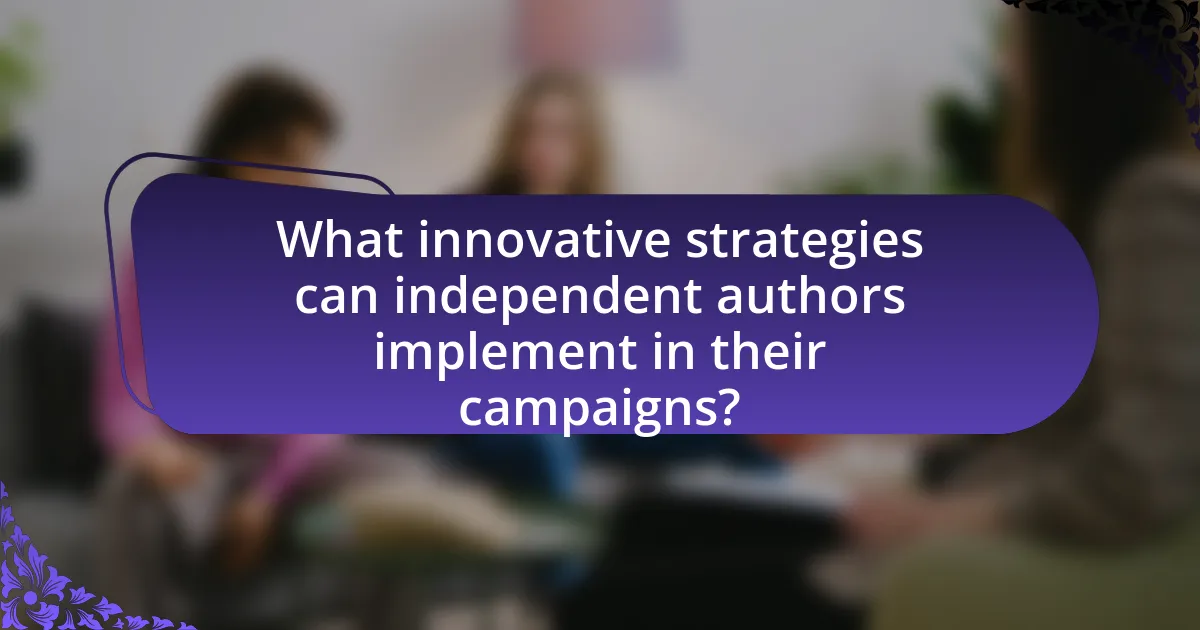
What innovative strategies can independent authors implement in their campaigns?
Independent authors can implement innovative strategies such as leveraging interactive content, utilizing targeted social media ads, and engaging in collaborative marketing. Interactive content, like polls and quizzes, fosters audience engagement and increases visibility, as evidenced by a 2021 study showing that interactive posts generate 50% more engagement than static content. Targeted social media ads allow authors to reach specific demographics, enhancing the effectiveness of their campaigns; for instance, Facebook’s ad platform enables precise targeting based on user interests and behaviors. Collaborative marketing with other authors or influencers can expand reach and credibility, as partnerships often lead to cross-promotion, which has been shown to increase audience size by up to 30%.
How can storytelling enhance social media campaigns?
Storytelling can enhance social media campaigns by creating emotional connections with the audience, which increases engagement and brand loyalty. When independent authors share compelling narratives about their writing journey, characters, or themes, they invite followers to relate personally to their work. Research indicates that posts with storytelling elements receive 300% more engagement than those without, demonstrating the effectiveness of narrative in capturing attention and fostering community. By weaving stories into their campaigns, authors can effectively differentiate themselves in a crowded market, making their messages more memorable and impactful.
What techniques can authors use to craft compelling narratives online?
Authors can craft compelling narratives online by utilizing techniques such as character development, immersive world-building, and engaging storytelling structures. Character development involves creating relatable and multidimensional characters that resonate with readers, which enhances emotional investment. Immersive world-building allows authors to construct vivid settings that draw readers into the narrative, making the story more engaging. Additionally, employing storytelling structures like the three-act structure or nonlinear timelines can create suspense and maintain reader interest. These techniques are supported by research indicating that well-developed characters and immersive settings significantly increase reader engagement and satisfaction, as highlighted in studies on narrative psychology.
How does storytelling influence audience connection and loyalty?
Storytelling significantly enhances audience connection and loyalty by creating emotional engagement and relatability. When narratives resonate with audiences, they foster a sense of belonging and understanding, which strengthens the bond between the storyteller and the audience. Research indicates that stories activate the brain’s mirror neurons, allowing listeners to empathize with characters and situations, thereby deepening their emotional investment. For instance, a study published in the journal “Psychological Science” found that stories can lead to increased feelings of empathy and connection, which are crucial for building loyalty. This emotional connection encourages audiences to return for more content, as they feel personally invested in the narrative and the storyteller’s journey.
What role do collaborations play in innovative campaigns?
Collaborations are essential in innovative campaigns as they leverage diverse skills and resources to enhance creativity and reach. By partnering with other authors, influencers, or brands, independent authors can tap into new audiences, share unique perspectives, and combine marketing efforts, which increases visibility and engagement. For instance, a study by the Content Marketing Institute found that 70% of marketers believe collaborations lead to more effective campaigns, demonstrating that shared expertise and resources can significantly amplify campaign impact.
How can authors partner with influencers to expand their reach?
Authors can partner with influencers by collaborating on promotional campaigns that leverage the influencer’s audience to increase visibility. This partnership can involve co-hosting events, creating joint content, or having influencers review or endorse the author’s work. For instance, a study by the Digital Marketing Institute found that 49% of consumers depend on influencer recommendations, highlighting the effectiveness of such collaborations in reaching new audiences. By strategically selecting influencers whose followers align with their target demographic, authors can significantly enhance their book’s exposure and engagement.
What are the benefits of cross-promotions with other authors?
Cross-promotions with other authors enhance visibility and expand audience reach. By collaborating, authors can tap into each other’s readership, increasing the likelihood of attracting new fans. For instance, a study by the Author Earnings Report indicates that authors who engage in cross-promotional activities see a 30% increase in book sales compared to those who do not. This strategy also fosters community building among authors, leading to shared resources and support, which can further amplify marketing efforts.
How can independent authors utilize emerging technologies in their campaigns?
Independent authors can utilize emerging technologies in their campaigns by leveraging social media algorithms, data analytics, and automation tools to enhance their reach and engagement. Social media platforms like Facebook and Instagram use algorithms that prioritize content based on user interaction, allowing authors to tailor their posts for maximum visibility. Data analytics tools can provide insights into audience demographics and preferences, enabling authors to create targeted marketing strategies. Additionally, automation tools can streamline posting schedules and manage interactions, freeing up time for authors to focus on content creation. These technologies collectively enhance the effectiveness of marketing campaigns, as evidenced by a 2021 study showing that targeted social media ads can increase engagement rates by up to 50%.
What are the advantages of using augmented reality in book promotions?
The advantages of using augmented reality in book promotions include enhanced engagement, interactive experiences, and increased visibility. Augmented reality allows readers to interact with book content in a dynamic way, such as visualizing characters or settings through their devices, which can lead to a deeper emotional connection with the material. This technology can also create memorable experiences that encourage sharing on social media, thereby amplifying promotional reach. For instance, a study by the International Journal of Information Management found that interactive content can increase user engagement by up to 94%, demonstrating the effectiveness of augmented reality in capturing audience attention and driving interest in books.
How can authors incorporate live streaming into their marketing efforts?
Authors can incorporate live streaming into their marketing efforts by hosting interactive sessions that engage their audience directly. These sessions can include book readings, Q&A segments, and discussions about writing processes, which foster a personal connection with viewers. According to a report by Livestream and New York Magazine, 80% of audiences prefer live video over blog content, highlighting the effectiveness of this medium in capturing attention. By utilizing platforms like Instagram Live, Facebook Live, or YouTube Live, authors can reach a wider audience and create real-time engagement, ultimately driving interest in their books and increasing sales.

What are the best practices for executing social media campaigns?
The best practices for executing social media campaigns include defining clear objectives, understanding the target audience, creating engaging content, utilizing analytics for optimization, and maintaining consistent branding. Clear objectives guide the campaign’s direction, ensuring that efforts align with specific goals such as increasing engagement or driving sales. Understanding the target audience allows for tailored messaging that resonates, leading to higher engagement rates. Engaging content, including visuals and interactive elements, captures attention and encourages sharing, which is crucial for organic reach. Utilizing analytics helps in measuring performance and making data-driven adjustments to improve results. Consistent branding across platforms reinforces recognition and trust among followers. These practices are supported by studies indicating that campaigns with defined goals and audience insights achieve up to 30% higher engagement rates compared to those without.
How can authors create a consistent brand presence online?
Authors can create a consistent brand presence online by establishing a clear and cohesive identity across all platforms. This involves using the same profile picture, bio, and tone of voice on social media, websites, and other online spaces. Consistency in visual elements, such as color schemes and fonts, reinforces brand recognition. Research indicates that brands with consistent presentation across all platforms can increase revenue by up to 23% (Lucidpress, 2019). Additionally, regularly engaging with followers through authentic content, such as behind-the-scenes looks or personal stories, helps to build a loyal audience and strengthens the brand’s presence.
What elements contribute to a cohesive author brand on social media?
A cohesive author brand on social media is built through consistent messaging, visual identity, and audience engagement. Consistent messaging involves using a unified tone and style across all platforms, which helps in establishing a recognizable voice. Visual identity includes elements like profile pictures, cover images, and color schemes that reflect the author’s personality and genre, creating a memorable aesthetic. Audience engagement is crucial; actively interacting with followers through comments, shares, and personalized content fosters a sense of community and loyalty. Research indicates that brands with consistent presentation across platforms can increase revenue by up to 23%, highlighting the importance of these elements in building a strong author brand.
How can authors maintain authenticity while promoting their work?
Authors can maintain authenticity while promoting their work by sharing genuine insights into their writing process and personal experiences. This approach fosters a connection with their audience, as readers appreciate transparency and relatability. For instance, authors can use social media platforms to post behind-the-scenes content, such as drafts, brainstorming sessions, or challenges faced during writing. Research indicates that 70% of consumers prefer to learn about products through content rather than traditional advertising, highlighting the effectiveness of authentic storytelling in engaging potential readers. By prioritizing honesty and personal narratives, authors can create a loyal following that resonates with their authentic voice.
What common pitfalls should independent authors avoid in their campaigns?
Independent authors should avoid several common pitfalls in their campaigns, including neglecting audience research, failing to create a consistent brand presence, and underestimating the importance of engagement. Neglecting audience research can lead to targeting the wrong demographic, resulting in wasted resources and ineffective messaging. A consistent brand presence across platforms helps build recognition and trust; inconsistency can confuse potential readers. Underestimating engagement means missing opportunities to connect with readers, as active interaction can significantly boost visibility and loyalty. According to a survey by the Author Earnings Report, authors who actively engage with their audience see a 30% increase in sales compared to those who do not.
How can authors prevent over-promotion and maintain audience interest?
Authors can prevent over-promotion and maintain audience interest by balancing promotional content with engaging, value-driven interactions. This approach involves sharing informative posts, behind-the-scenes insights, and personal stories that resonate with the audience, rather than solely focusing on sales pitches. Research indicates that content that provides value, such as tips or relatable experiences, fosters a stronger connection with followers, leading to sustained interest and engagement. For instance, a study by HubSpot found that 60% of consumers feel more positive about a brand after consuming content that is helpful and informative. By prioritizing audience engagement over constant promotion, authors can cultivate a loyal following and enhance their overall brand presence.
What strategies can mitigate negative feedback on social media?
To mitigate negative feedback on social media, independent authors should actively engage with their audience and respond promptly to criticism. Engaging with followers fosters a sense of community and shows that the author values their opinions. For instance, a study by the Pew Research Center indicates that 70% of users appreciate brands that respond to their comments, which can help turn negative experiences into positive interactions. Additionally, authors can implement a proactive approach by monitoring their social media channels for mentions and addressing potential issues before they escalate. This strategy not only demonstrates accountability but also helps maintain a positive online presence.
What practical tips can independent authors follow for successful campaigns?
Independent authors can enhance their campaign success by leveraging targeted social media strategies. First, they should identify their target audience and tailor content to engage that specific demographic, as research indicates that personalized marketing can increase engagement rates by up to 202%. Next, authors should utilize visually appealing graphics and videos, as posts with images receive 94% more views than text-only posts. Additionally, consistent posting schedules can improve visibility; studies show that brands that post regularly see a 50% increase in engagement. Collaborating with influencers in their genre can also expand reach, as influencer marketing can yield an average return of $5.78 for every dollar spent. Finally, authors should actively engage with their audience through comments and direct messages, fostering a community that can lead to higher loyalty and word-of-mouth promotion.
How can authors effectively schedule and plan their social media content?
Authors can effectively schedule and plan their social media content by utilizing content calendars and automation tools. Content calendars allow authors to outline their posts in advance, ensuring a consistent and strategic approach to engagement. Automation tools, such as Hootsuite or Buffer, enable authors to schedule posts at optimal times, maximizing audience reach and interaction. Research indicates that consistent posting can increase engagement rates by up to 50%, highlighting the importance of a well-structured plan. By combining these methods, authors can maintain a steady online presence while focusing on their writing.
What tools can assist authors in managing their social media presence?
Authors can utilize tools such as Hootsuite, Buffer, and Sprout Social to effectively manage their social media presence. Hootsuite allows authors to schedule posts across multiple platforms, track engagement metrics, and monitor conversations about their work, which is essential for maintaining an active online presence. Buffer offers similar scheduling capabilities and provides analytics to help authors understand their audience better. Sprout Social enhances this by offering robust reporting features and social listening tools, enabling authors to engage with their readers more effectively. These tools are widely recognized in the industry for their ability to streamline social media management and improve audience interaction.
